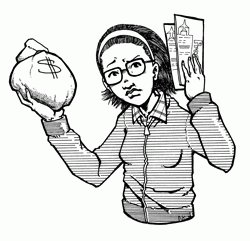Win a typical literary contest and you will probably receive at least one of the following: money, publication in a literary magazine or a book, and a certain amount of recognition. This is standard recompense for emerging writers looking to further their careers. But some rather unusual awards are handed out each year that don’t fall within the usual “money plus publication” category. Many are familiar to writers who regularly navigate the contest circuit, while others operate just off the beaten path.

Showcasing a unique blend of literary exhibitionism and popular culture, LitIdol, a contest sponsored by the London Book Fair, seeks to discover the next best-selling author much the same way that American Idol discovers musical talent. Instead of signing a record deal, the winner of LitIdol receives representation from Curtis Brown, the British literary agency.
This is how it works: Fiction writers submit up to 10,000 words of their novels, along with a synopsis. Professional readers choose a short list of five finalists, and those writers give a televised reading of their work in front of a judging panel, after which a winner is announced. To cash in on the popularity of reality TV, the contest organizers hired Tony Cowell, the brother of Simon Cowell, American Idol’s brutally honest arbiter of musical taste, to serve as one of the judges.
The winner of the first LitIdol competition—open to unpublished fiction writers everywhere—was Canadian writer Paul Cavanagh, who went on to sign a book deal with HarperCollins Canada. The winner of the 2005 contest, which was open only to writers of crime fiction and thrillers, will be announced at the London Book Fair this month.
While most of the contests sponsored by the Academy of American Poets offer standard, albeit generous, cash prizes—the $100,000 Wallace Stevens Award and the $25,000 Academy Fellowship, for example—there are a couple that offer something more. The Walt Whitman Award and the James Laughlin Prize, given for a poet’s first and second book, respectively, each offers a $5,000 cash prize. In addition, the Academy purchases 5,500 copies of the winning writer’s book for distribution to its members. Considering that the average print run for a book of poetry is well below 5,000, the Academy’s guaranteed purchase is significant.
From 1998 to 2003, the Academy’s Greenwall Fund provided grants of up to $3,000 to support the publication of first poetry books by independent presses. But the money didn’t go to the poet—it went to the publisher to offset production and marketing costs. Four Way Books, New Issues Press, and Alice James Books were a few of the publishers that benefited from the unique award, along with the poets whose books were allocated a larger budget. Although the grants are no longer offered by the Academy, associate director Charles Flowers says he hopes to receive additional funding to revive the grant program in the future.
Recognizing the importance of the poet-mentor relationship, Grub Street, a writing center in Boston, recently launched an annual poetry fellowship that offers a poet the opportunity to work with a mentor. Ron MacLean, Grub Street’s executive director, says the goal of the new fellowship is “to take a draft of a manuscript and revise toward publication.” Poets in the Boston area are invited to submit a manuscript along with a revision plan by March 31. The winner, to be announced at the end of June, will receive $2,500. An additional $1,000 will go to a mentor of the fellow’s choice, with the understanding that the two will work on the manuscript together, revising it toward publication.
Putting a socially conscious spin on the typical literary contest, Pudding House Publications, a small press in Columbus, Ohio, sponsors the annual Give ’em Shelter Poetry Chapbook Competition. The winner receives $1,000; Pudding House donates an additional $1,000 to Open Shelter, a nonprofit provider for the homeless in Columbus, in the winner’s name.
A smaller version of the chapbook contest was launched in the early 1980s, when Pudding House expanded from a literary magazine to a small press. For years it charged a $10 entry fee and awarded a $100 prize. But director Jennifer Bosveld says the contest grew into something larger when her husband, Jim Bosveld, passed away last year. “One of our mutual charities was the Open Shelter,” she says. “When he died, we established a memorial fund, and a lot of money was collected for it. We thought it would be good to establish a larger prize that could give something to the poets and something to the poor.” Bosveld says she receives hundreds of submissions for the annual contest, which now charges a $15 entry fee.
Instead of money, several competitions offer the opportunity to travel. Take Western Michigan University’s Prague Summer Program Fellowships, for instance. Three writers are awarded annual fellowships to attend a four-week creative writing conference in Prague. If that isn’t tempting enough, writers can enter the fiction and poetry contest sponsored by Summer Literary Seminars in St. Petersburg, Russia. Two prizes—each including airfare, accommodations, tuition to attend the seminars, and publication in Fence magazine—are given every year.
The Japan–U.S. Friendship Commission, in conjunction with the National Endowment for the Arts, sponsors an annual competition that offers up to five six-month residencies in Japan, including housing, transportation, and language study. Although you can’t put a price on friendship, each residency is worth close to $40,000—or around 4 million yen.
For writers who prefer to stay in this country, many contests offer nonmonetary awards in the form of public readings. Arguably the most prestigious of these is the annual “Discovery”/the Nation Prize, sponsored by the Unterberg Poetry Center. The four annual winners receive not only $500 and publication in the Nation, but also an expenses-paid trip to read at the 92nd Street Y in New York City. The prize is designed to attract large audiences to poets who have not yet published a book of poems.
The annual Writers Exchange Contest, sponsored by Poets & Writers, Inc., the nonprofit organization that publishes this magazine, brings two emerging authors to New York City to meet with prominent writers, editors, agents, and other members of the literary community. These connections can prove more valuable than the $500 cash prize.
The amount of money awarded by sponsors of literary contests has risen steadily over the years. The 1,071 creative writers who won contests and were listed in the Grants & Awards section of this magazine in 2004 received over $9.8 million, nearly a million dollars more than had been awarded the previous year. But for some sponsoring organizations—and for many writers—it’s not all about the money.
Kevin Larimer is the senior editor of Poets & Writers Magazine.








